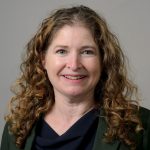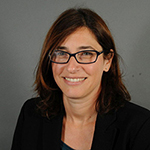UConn Today featured undergraduate researcher *Kayvona Brown who is currently enrolled in the HDFS Research Practicum with Assistant Professor Marketa Burnett exploring Black caregivers’ hopes and dreams for their daughters. Link: https://today.uconn.edu/2025/03/meet-the-undergraduate-researcher-kayvona-brown-clas/#
Faculty
Child Labs training workshop offered at EASTCONN conference

Marianne Legassey presented a training workshop to community childcare providers at the EASTCONN Annual Infant Toddler conference on March 7th. Marianne presented Trauma Informed Practices in Early Childhood. Christine Perkins, Child Labs Master Toddler Teacher and Kelly Clark, Child Labs Master Infant Teacher, presented a workshop at the conference. The workshop, cycle of Intentional Teaching for Sensory-Based Play with Infants and Toddlers, provided participants (infant and toddler center based teachers) opportunities to explore and create materials for their classrooms along with learning about intentional interactions with infants and toddlers.
HDFS faculty and grad students present at SBM conference
Eight HDFS faculty and four HDFS graduate students will be presenting 12 posters at the Society of Behavioral Medicine (SBM) in San Francisco, CA at the end of March! See them all here
Eva Lefkowitz, HDFS Faculty Spotlight, March 2025

Eva Lefkowitz lived in Connecticut the first 18 years of her life. After living in the Boston area for six years, she earned her Ph.D. from University of California, Los Angeles in Developmental Psychology. She then served as a professor of Human Development and Family Studies at the Pennsylvania State University for 18 years, including roles as Professor-in-Charge of the HDFS Graduate Program and Professor-in-Charge of the Undergraduate Program. In 2016 Eva moved to UConn to become Department Head of HDFS. In her almost nine years as department head, Eva has enjoyed getting to know the faculty, staff, and students in HDFS, CLAS, and UConn.
Eva’s research has two primary areas: (1) sexual health and (2) wellbeing among LGBTQ+ adolescents and young adults. In the first area, she uses a developmental perspective to examine predictors of negative and positive aspects of sexual health, and the broader health and relationship implications of sexual health. Her research demonstrates that a range of individual and contextual factors, from the couple level of who the partner is up to the institutional level of identification with a religious institution, are associated with sexual health. In addition, her research highlights the importance of sexual behaviors beyond their implications for physical health, demonstrating that by young adulthood, sexual behavior can positively contribute to well-being. Eva views mentoring as the most important and rewarding aspect of her career, and her students strongly influence the direction of her research. In the second area, driven by the interests of some of her UConn graduate students, she has examined wellbeing and identity expression among LGBTQ+ college students, and how relational and contextual factors influence these areas. She and her students received funding and collected data on LGBTQ+ college students around the country as they adjusted to the COVID-19 pandemic. More recently they collected data on how LGBTQ+ students’ experiences with family, peers, romantic partners, and close others affect their well-being, and how academic breaks may change these experiences.
Eva has served as a principal investigator, co-investigator, or faculty mentor on projects funded by the NICHD, NIAAA, NIDA, NIA, and the WT Grant Foundation. She has published 108 peer reviewed articles and book chapters. At the national level, Eva has been in leadership roles for the Society for Research on Adolescence (SRA) and the Society for the Study of Emerging Adulthood (SSEA). She has contributed to the review process as Associate Editor for Developmental Psychology, on the editorial boards of Journal of Research on Adolescence and Emerging Adulthood, as a reviewer for more than 25 other journals, and as a Review Panel Chair and Reviewer for SRA, SRCD, and SSEA. She also has reviewed grant proposals for NIH, and for similar federal agencies outside the United States. In 2008 Eva received the Evelyn R. Saubel Faculty Award from the Penn State College of Health and Human Development.
At UConn, Eva’s favorite classes to teach have been the 350 student lifespan individual and family development class (for many students, their first college class ever), and a small graduate seminar on professional and career development.
When not working, Eva spends time with her husband Eric, also a UConn professor, and enjoys visiting her twins, both college first years, who were frequently delighted by a childhood filled with are her extensive knowledge of adolescent development (not exactly). Eva loves cooking and baking, walking, beach vacations, and listening to audiobooks, and still hasn’t figured out how to write a spotlight that doesn’t sound like a dating app profile.
Na Zhang led mindfulness workshop for students at UConn Stamford
 Assistant Professor Na Zhang recently organized a mindfulness workshop at UConn Stamford. She led students in meditation and discussed how to work with stress and improve quality of attention. Na plans to have one or two more of these workshops this semester.
Assistant Professor Na Zhang recently organized a mindfulness workshop at UConn Stamford. She led students in meditation and discussed how to work with stress and improve quality of attention. Na plans to have one or two more of these workshops this semester.
HDFS faculty featured in UConn’s State of Impact report



HDFS faculty featured in UConn’s report State of Impact! Specifically, Marlene Schwartz’s project in East Hartford schools to promote child health and wellbeing, and Rachel Chazan Cohen and Caitlin Lombardi’s work with CT child care centers and family child care homes were both highlighted in the report. Read the full report here, and find HDFS faculty work highlighted on page 24.
Anne Bladen, HDFS Faculty Spotlight, February 2025
 Anne Bladen has spent her career supporting families, children and students. After earning her BA in Anthropology from Bryn Mawr College, she worked as a bilingual Welfare Caseworker in Willimantic, CT, during a time period marked by the AIDS crisis, opioid epidemic, and severe cuts to social programs. Seeing the challenges her clients faced, Anne decided to shift gears and focus on making an impact earlier in people’s lives. Reflecting on her volunteer work with young children in high school and college, she applied to UConn’s Teacher Certification Program for College Graduates.
Anne Bladen has spent her career supporting families, children and students. After earning her BA in Anthropology from Bryn Mawr College, she worked as a bilingual Welfare Caseworker in Willimantic, CT, during a time period marked by the AIDS crisis, opioid epidemic, and severe cuts to social programs. Seeing the challenges her clients faced, Anne decided to shift gears and focus on making an impact earlier in people’s lives. Reflecting on her volunteer work with young children in high school and college, she applied to UConn’s Teacher Certification Program for College Graduates.
Anne completed her MA in special education, focusing on children with special needs and implementing Alternative and Augmentative Communication with bilingual preschool children. Her teaching journey began in Hartford’s public preschools, where she discovered the power of early intervention. After leaving Hartford, Anne taught special education for preschoolers and their typically developing peers as well as resource room support for students in grades K-4.
In 1996, Anne joined the UConn Child Development Labs (CDL) as a kindergarten teacher, later becoming the Special Needs Coordinator and then the Executive Director of the Child Labs, a position she held until 2021. Some of the highlights of these years included building a more nature-based program, working with teachers on play-based curriculum, teaching pre-service teachers in Early Childhood Specializations and developing collaborative relationships with other UConn departments such as Kinesiology, Communication Sciences, and Psychology to support both children at the Child Labs and UConn students.
In 2021, Anne transitioned to a full-time teaching faculty role in HDFS. This change has offered new opportunities, such as teaching different (and bigger!) classes but also keeps her deeply connected with the Child Labs and the incredible teachers who have been her community for so many years. In conjunction with the CDL teachers, Anne developed and started teaching HDFS 2142E: Exploring Conservation and Sustainability with Preschoolers in 2022, allowing her to continue to share her passion for nature with children and students. Anne has also had the opportunity to return to her Windham roots, building a partnership with the Head Start and Early Head Start programs so that students in HDFS 3192 (supervised fieldwork) now have placements in those programs, deeply enriching their experiences.
At home, in the Mansfield Hollow Historic District, Anne enjoys gardening, quilting, biking, and watching clouds and birds from the hammock. Her son, a UConn grad, works for the Conservation Fund and her daughter is an incoming member of the UConn class of 2029!
Rebecca Puhl interviewed by NYT
 The New York Times interviewed Rebecca Puhl for their article “New Obesity Definition Challenges Current Use of BMI”. https://www.nytimes.com/2025/01/14/health/bmi-obesity-definition.html
The New York Times interviewed Rebecca Puhl for their article “New Obesity Definition Challenges Current Use of BMI”. https://www.nytimes.com/2025/01/14/health/bmi-obesity-definition.html
Child Labs donate to CT Children’s Medical Center
The Child Labs community participated in CT Children’s Medical Center’s Pajama Day on Friday December 13th. Children, college students and staff wore pjs to school and made donations to CCMC to support children experiencing extended hospital stays. The Child Labs community raised more than $200!
Charles Super, HDFS Faculty Spotlight, January 2025
 Charlie Super learned early in life that people in different places behave differently. He grew up in suburban New Jersey, but spent many summers with his mother’s parents in rural Georgia. His father, though American-born, grew up in Europe; Charlie had his own taste of Europe as a teenager, when the family spent a year in Paris.
Charlie Super learned early in life that people in different places behave differently. He grew up in suburban New Jersey, but spent many summers with his mother’s parents in rural Georgia. His father, though American-born, grew up in Europe; Charlie had his own taste of Europe as a teenager, when the family spent a year in Paris.
After undergraduate education in conventional psychology at Yale, and graduate training in developmental psychology at Harvard’s interdisciplinary Social Relations department, Charlie thought he knew a great deal about the development of American children, but was unsure how much of that was relevant to children in other places; he wanted to live and work for an extended period in someplace very different. In the meantime, he had discovered True Love. He and Sara Harkness were married not long before she needed to do field work for her doctorate in Anthropology. The cooperative exchange program between Harvard and the University of Nairobi offered a perfect opportunity for both of them. With support from the Carnegie and W. T. Grant foundations, Charlie and Sara moved to a farming community in western Kenya. They lived there for three years and started their family among the Kipsigis peoples of Kokwet.
Returning to the U.S. offered many opportunities, but not academic jobs. Cambridge proved a good base for research grants, short-term teaching, consulting, and raising children in an urban, family-friendly environment. It also offered a window to re-engage in applied work; a stint working for the 1970 White House Conference on Children during graduate school had sharpened Charlie’s understanding of the need for scientifically informed interventions, and the time in rural Kenya had only expanded on that. In these Cambridge years, he worked with two large intervention programs for infant and child health, in Bangladesh and in Colombia, and completed the necessary training for licensure as a child-clinical psychologist.
The Harkness-Super family moved to Penn State in 1988 when both Charlie and Sara were offered tenured positions, Charlie as Head of the Department of Human Development and Family Studies. In addition to initiation into academic administration and Land Grant values, central Pennsylvania also offered a remarkable clinical experience. State College, home to the university, is “centrally isolated”, as the locals say, smack in the middle of Appalachia. As the only doctoral-level child clinician in a four-county area, he saw a range of mental suffering and resilience unavailable in a Boston practice, everything from infant sleep problems to childhood dissociative identity disorder. There was also more field work, this time in the Netherlands, and now as a family journey. It was a period of ethnographic discovery and intellectual adventure, setting the stage for a return visit four years later.
At the end of that second work in the Netherlands, Charlie and Sara accepted offers from the University of Connecticut. Charlie came as Dean of the School of Family Studies, and this presented an opportunity to advance his ideas on a culturally informed curriculum in the context of an institutional history that appreciated the interplay of theory and practice. For him, this combined the interdisciplinary vision of Social Relations and the use of knowledge exemplified in the Land Grant tradition. Over the next decade, HDFS became the largest undergraduate major at UConn, increased research funding six-fold, and established two research and outreach Centers, a student Writing Center, HDFS’s first high-tech seminar room, the “Grad Lab,” and Lu’s Café. When the University reorganized in 2006, eliminating three Colleges, HDFS became a department in the College of Liberal Arts and Sciences, and Charlie returned to the faculty.
Research and writing have always been a vital part of Charlie’s academic life; in 2009 he and Sara shared the Society for Research in Child Development’s inaugural award for Cultural and Contextual Factors in Child Development. The Kenyan work produced the Developmental Niche framework for understanding culture’s role in shaping child development, as well as multiple examples. Research on parental ethnotheories, started in Cambridge, came to fruition in the Dutch fieldwork and its sequel, the International Study of Parents Children and Schools, which explored variation within Europe and its diaspora, working with colleagues from sites in Sweden, Poland, the Netherlands, Italy, Spain, Australia, and the U.S. A further follow-up – the International Baby Study –advanced our understanding of how differences in the developmental niche in samples of U.S. and Dutch infants led to dramatic differences in sleep and the related biology of arousal. A book specifically on parental ethnotheories (edited by Harkness and Super) brought the niche framework to a broad audience of developmentalists and psychological anthropologists. The concepts are now widely used in research on culture and child development.
The importance of action continues as a theme in Charlie’s academic and personal life. Through the Center for the Study of Culture, Health, and Human Development, Charlie helps oversee the National Family Development Credential Program, a nation-wide training that annually certifies about 1,000 front-line family workers in supportive and empowerment skills. He is Principal Investigator on a series of contracts with the Connecticut Office of Early Childhood to provide evaluations of this and other interventions. On the leadership front, he has recently rotated off eight years of service on the U.S. National Committee for Psychological Science, organized by the National Research Council at the National Academy of Sciences. In that role he co-organized two national conferences on the issues facing the discipline in a globalizing world.
Outside his professional life, Charlie served as chair of the Woodstock Democratic Town Committee for 14 years, enjoys being a husband, father, and grandfather, and occasionally plays ragtime piano.